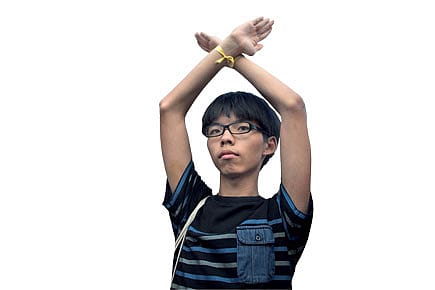A Bogus Chinese Dream

The streets of Hong Kong may go quiet and Wong may vanish from front pages, but the eruption of minds is what frightens autocracies such as China
In the history of resistance, certain images linger. A face, anonymous, but one that has overcome fear. The lone man standing in front of a column of advancing tanks in Tiananmen Square on that morning in June 1989 is one such image. Over the years, as China leaped forward as an economic power, the ghosts of Tiananmen took refuge in the grey zones of the Asian gulag, beyond the much mythicised marketplace that continues to dazzle the world. 'The Tank Man' is still a source of great speculation and mystery, but he lives in faded photographs and memory as an abiding symbol of defiance—of the sacrificial moment of freedom in a country whose revolutionary history is a study in the dispensability of human lives. Tiananmen itself, after all, in the words of Deng Xiaoping, was just an 'incident' involving a few wayward students and, to borrow from the lexicon of the Cultural Revolution, other counter- revolutionary bad eggs. Twenty-five years on, the People's Republic dreads 'incidents' that can shatter the idyll of autocracy. And then, another face appears in Hong Kong.
I read about Joshua Wong, 17 years old, in a report from Hong Kong in The New York Times. He is the boy revolutionary of freedom, the most sought-after face by television cameras from Civic Square, the dateline of Free Hong Kong. He tells the paper: "When I heard the national anthem starting to play, I certainly did not feel moved so much as angry. When it tells you, 'Arise! All those who refuse to be slaves!'—why is our treatment today any different from the slaves?" Wong is the kind of protestor who the keepers of Hong Kong are scared of. They will not send tanks to crush the so-called umbrella revolutionaries, but they will not let the virus of freedom spread either. But a Wong, who thinks himself a slave in the island of controlled freedom, is a dangerous teenager Beijing can't afford to ignore. Icons of dissent are not to be allowed at a time when the homogenisation of conscience is a never-ending project in the mainland. But Wong's self portrait as a slave in one of the world's most prosperous places has already exposed the fundamental fallacy of 'One Country, Two Systems.' If China wants to control even the selection of candidates for the island's next administrator, it is nothing but One Country, One Horrific System.
Openomics 2026: Continuity and Conviction
06 Feb 2026 - Vol 04 | Issue 57
The performance state at its peak
Wong's acquired slave identity shows up the unviability of the system. When the British handed over the island to China in 1997, it was not supposed to be the beginning of some kind of socialist assimilation. Certainly not. And Wong, by excusing himself from the benevolence of Beijing, becomes the representative of a generation that does not feel at home in the system. He becomes one with his counterparts in mainland China, where one of the world's most successful market regimes is built on an unadulterated Marxist-Leninist structure, and where questions from those who see themselves as 'slaves' are least tolerated. It has always been a totalitarian pretense: I'll make you happy, be quiet. The rulers, the social capitalists, love the quietness. They call it order. They call it the reward of state- provided happiness.
It was this quietness that was broken in 1989, when Dengism was at its peak. The system has been consistently banishing the noisemakers of democracy from the streets ever since. Today's dissidents, denied terrestrial existence, are wangmin, citizens of the internet. (Emily Parker's Now I Know Who My Comrades Are: Voices from the Internet Underground, written about in this space, is a fine introduction to the online movement for freedom in China and other such closed societies.) As the paranoid Beijing now controls the streets as well as the web, the proxy server is the last weapon of the freedom fighter.
The streets of Hong Kong may go quiet and Wong may vanish from front pages, but the eruption of minds is what frightens autocracies such as China. In the last few years, such uprisings have changed regimes, and sent out a message to rulers who think that their make believe is history proof. China will not go the Soviet way in the near future because it is not an artificially assembled empire. The ideology by which the leaders swear may still be communism but what powers China is nationalism, and democracy is something Western, capable of contaminating the Oriental mind, steeped in historical grievances and injured national pride. It is one of those rare places where Marx, Mao, Confucius and Adam Smith co-exist in perfect harmony—a terrifying symmetry achieved by the bloodlust of a revolution that swept the countryside. But China is busy building what the West had achieved better—everything Western is desirable except the epidemic of democracy. It is this paradoxical system that makes Wong feel a slave.
The paradox is magnified by the new Helmsman Xi Jinping's slogan of the 'China Dream', an obvious American inspiration. This made-in-China Dream is turning into a nightmare for Joshua Wong and his friends.
